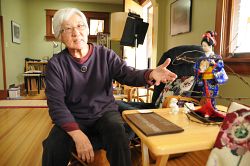Artist to speak about her memoir describing her WWII internment camp experiences
Friday, Mar. 20, 2015

Intermountain Catholic
+ Enlarge
Lily Yuriko Nakai Havey, at her Sugar House area home, displays a geisha doll surrounded by barbed wire that was a centerpiece at a talk she gave concerning her experiences in Camp Amache, a WWII internment camp. The organizer of the talk gave Havey the centerpiece as a gift.IC photo/Marie Mischel
SALT LAKE CITY — In 1942, President Franklin D. Roosevelt’s Executive Order 9066 forced 120,000 Japanese Americans from their homes on the West Coast. They were sent to relocation camps, of which there were 10 in the United States.
For 10-year-old Lily Yuriko Nakai, the Granada War Relocation Center (also known as Camp Amache) in southwestern Colorado was a frightening place. If she left her barracks at night to go to the latrine, a guard’s spotlight followed her. A jackrabbit hopping through the barbed wire fence reminded her of the freedom she was denied. She longed for the things she had been forced to abandon, like the ocean and oranges.
When World War Two ended and the camp closed, the Nakai family moved to Utah, where relatives were able to help them get established.
Fifty years later, having grown up, married, worked as a teacher and raised a family, Lily Yuriko Nakai Havey still suffered from a fear of bright artificial lights and an intense reaction to noise. She heard of war veterans with similar symptoms who were being diagnosed with post-traumatic stress syndrome, and wondered if she, like they, could benefit from art therapy.
After a year of art lessons, she painted her first watercolor: “Towers of Arcadia,” a bold red and black canvas with skeletons, a hand bearing an internment camp number, a glaring watch tower and, beyond the barbed wire fence, the sun.
The painting expresses not only her fear of being shot, but also her bewilderment at being imprisoned, Havey said.
More watercolors depicting scenes from the camp followed. She had requests to display her work at libraries in the Salt Lake area, and to write a paragraph describing each piece. She found, however, that one paragraph wasn’t enough to tell the story, and soon she had a book containing those stories along with the accompanying art. Last year, the University of Utah Press published the memoir under the title Gasa Gasa Girl Goes to Camp: A Nisei Youth Behind a World War II Fence.
“Stained glass was my business for 30 years, so to be known as an author is very strange to me,” Havey said. “I think of myself as a stained-glass artist.”
The adjective “gasa gasa” could be translated at “fidgety;” Havey recalls her mother frequently telling her to stop moving so much, but “sitting still is not in my nature.”
Havey, who gives public talks about her work, continues to paint scenes from the internment camp. Her latest is of a Navajo woman with a basket of fry bread; such a woman boarded the train heading to Camp Amache and offered the bread to the internees.
“I’d also like to do a real winter scene [of Camp Amache]; I’ve tried to do it a couple of times, but snow with watercolor is so hard,” she said.
When she gives talks, she often hears from others who were affected by the camps. For example, at one presentation in Brigham City she met a man whose father saw the Japanese Americans on the train to the Topaz internment camp near Delta. The man’s father decided to act, and took a family off the train to his farm, where they stayed until the war ended.
“It changed their lives,” Havey said. “Who hears about that?”
Havey will speak about her experiences during the March 26 Aquinas Institute of Saint Joseph Catholic Schools event.
The Aquinas Institute, which was formed last year, began with the idea “that there are a lot of social justice topics that we can discuss in a progressive, lively forum, and be better off for having had the discussion,” said Joanna Wheelton, president of Saint Joseph Schools.
The presentation will be Thursday, March 26, 7 p.m. in the Saint Joseph Catholic High School Evans Black Box Theater,
1790 Lake St. in Ogden. It is free and open to the public. Copies of Havey’s book will be available for purchase.
For questions, comments or to report inaccuracies on the website, please CLICK HERE.
© Copyright 2025 The Diocese of Salt Lake City. All rights reserved.
© Copyright 2025 The Diocese of Salt Lake City. All rights reserved.

Stay Connected With Us